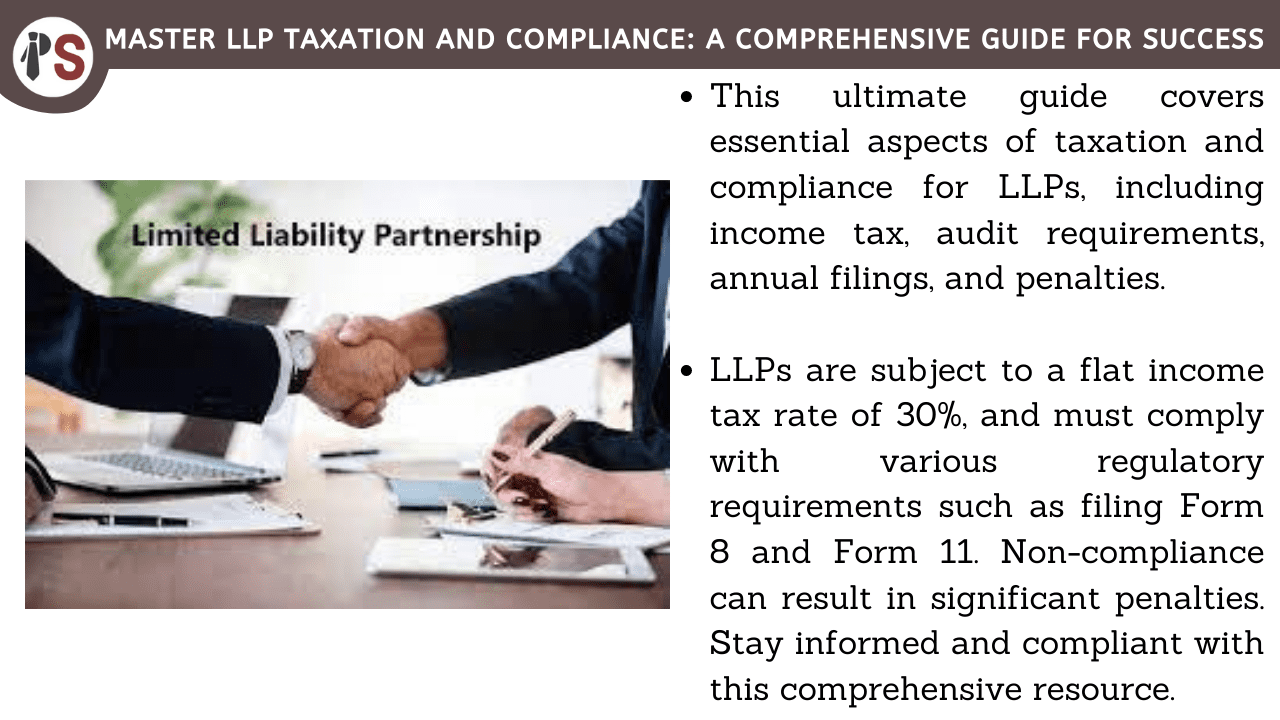
Limited Liability Partnerships (LLPs) have become a popular choice for businesses due to their unique combination of limited liability for partners and ease of management. However, with this business structure comes a set of tax obligations and compliance requirements that must be adhered to. This comprehensive guide will provide you with essential information on taxation and compliance for LLPs, enabling you to make informed decisions and remain compliant. For more information and assistance, visit Professional Saathi.
Introduction to Limited Liability Partnerships
Taxation of LLPs
LLP Compliance Requirements
Auditing and Annual Filings
Penalties for Non-Compliance
A Limited Liability Partnership (LLP) is a corporate entity that combines the features of a partnership and a company. It offers limited liability protection to its partners while requiring fewer compliance requirements than a private limited company. LLPs are governed by the Limited Liability Partnership Act, 2008, and are regulated by the Ministry of Corporate Affairs (MCA).
LLPs are considered separate legal entities from their partners, and as such, they are subject to their own tax obligations:
Income Tax: LLPs are taxed at a flat rate of 30% on their total income. In addition, a Health and Education Cess of 4% on the income tax is also applicable.
Alternative Minimum Tax (AMT): If an LLP claims certain exemptions or deductions, it may be subject to AMT at a rate of 18.5% on its adjusted total income. The AMT rate also attracts a 4% Health and Education Cess.
Tax on Distributed Profits: Unlike companies, LLPs are not required to pay tax on the distribution of profits to their partners. Partners are taxed individually based on their share of the profits.
Tax Deducted at Source (TDS): An LLP is required to deduct TDS on certain payments made to residents and non-residents as per the Income Tax Act.
LLPs must adhere to a set of regulatory and statutory compliance requirements, including:
LLP Agreement: An LLP must draft and file an LLP Agreement with the MCA within 30 days of incorporation. This agreement outlines the rights, duties, and responsibilities of the partners.
Designated Partners: An LLP must have at least two designated partners, one of whom must be a resident of India.
Books of Accounts: LLPs must maintain proper books of accounts on a cash or accrual basis. These books must be maintained at the registered office of the LLP.
Digital Signature Certificate (DSC): Designated partners must obtain a digital signature certificate for the electronic filing of documents with the MCA.
Permanent Account Number (PAN) and Tax Deduction Account Number (TAN): An LLP must obtain a PAN and TAN for tax purposes.
LLPs must comply with annual filing and auditing requirements, which include:
Audit Requirements: An LLP is required to have its accounts audited if its annual turnover exceeds INR 40 lakhs or its capital contribution exceeds INR 25 lakhs.
Form 8 (Statement of Account & Solvency): All LLPs must file Form 8 with the MCA within 30 days from the end of six months of the financial year. This form contains a declaration of solvency and a statement of assets and liabilities.
Form 11 (Annual Return of LLP): Every LLP must file Form 11 with the MCA within 60 days of the close of the financial year. This form includes information about partners, designated partners, and any changes that occurred during the financial year.
Income Tax Return (ITR): LLPs are required to file their income tax return using Form ITR-5. The due date for filing the income tax return is July 31st for non-audited LLPs and September 30th for audited LLPs.
Non-compliance with statutory and regulatory requirements can result in penalties for the LLP and its partners. Some common penalties include:
Late Filing Fees: Delay in filing annual forms (Form 8 and Form 11) can result in a daily penalty of INR 100 per day, per form, until the default continues.
Penalty for Non-Audit: If an LLP fails to get its accounts audited as required, it can be penalized with a fine ranging from INR 25,000 to INR 5 lakhs. The designated partners may also be subject to a fine of INR 10,000 to INR 1 lakh.
Penalty for Non-Filing of Income Tax Return: Failure to file income tax returns within the due date can result in a penalty of INR 5,000 (if filed by December 31st) or INR 10,000 (if filed after December 31st). However, the penalty is limited to INR 1,000 for LLPs with total income not exceeding INR 5 lakhs.
Staying compliant with the various tax and regulatory requirements is crucial for the smooth functioning of an LLP. By following this ultimate guide, you can ensure that your LLP remains in good standing with the authorities. For more information and assistance with LLP taxation and compliance, visit Professional Saathi.
At Professional Saathi, we offer a range of business consultancy services that help businesses improve their performance, achieve growth, and overcome challenges.
Copyright 2026 © Created By KTPG PROFESSIONAL SAATHI CORPORATE CONSULTANT PRIVATE LIMITED, All Rights Reserved.
Leave Your Comment